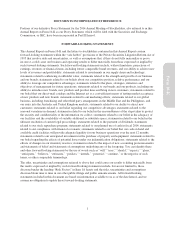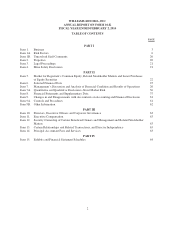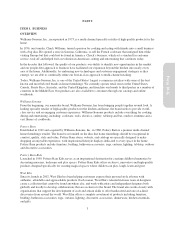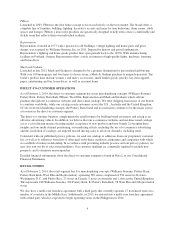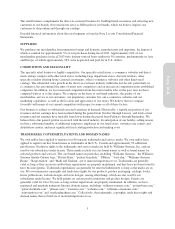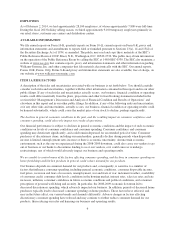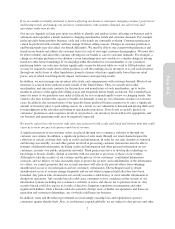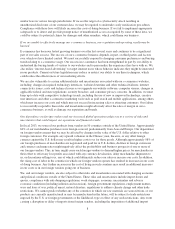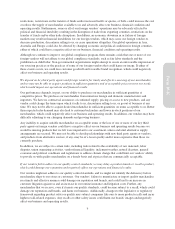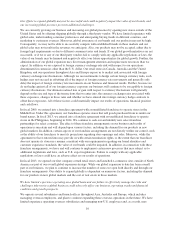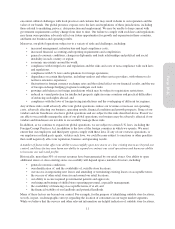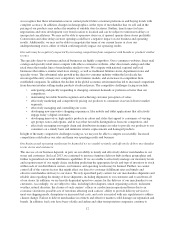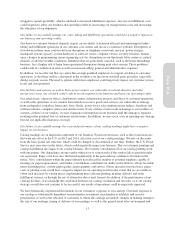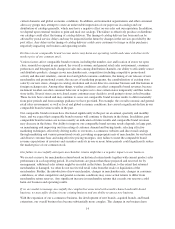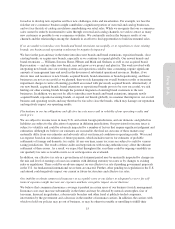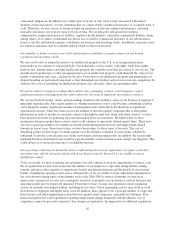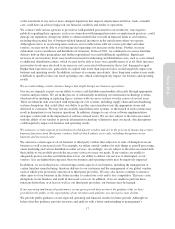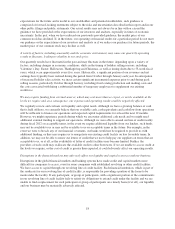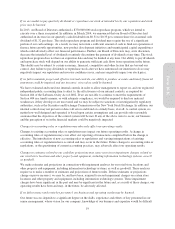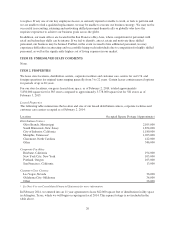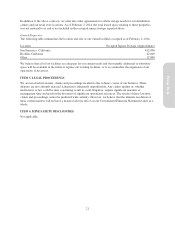Pottery Barn 2013 Annual Report Download - page 25
Download and view the complete annual report
Please find page 25 of the 2013 Pottery Barn annual report below. You can navigate through the pages in the report by either clicking on the pages listed below, or by using the keyword search tool below to find specific information within the annual report.
encounter cultural challenges with local practices and customs that may result in harm to our reputation and the
value of our brands. Our global presence exposes us to the laws and regulations of these jurisdictions, including
those related to marketing, privacy, data protection and employment. We may be unable to keep current with
government requirements as they change from time to time. Our failure to comply with such laws and regulations
may harm our reputation, adversely affect our future opportunities for growth and expansion in these countries,
and harm our business and operating results.
Moreover, our global operations subject us to a variety of risks and challenges, including:
• increased management, infrastructure and legal compliance costs;
• increased financial accounting and reporting requirements and complexities;
• general economic conditions, changes in diplomatic and trade relationships and political and social
instability in each country or region;
• economic uncertainty around the world;
• compliance with foreign laws and regulations and the risks and costs of non-compliance with such laws
and regulations;
• compliance with U.S. laws and regulations for foreign operations;
• dependence on certain third parties, including vendors and other service providers, with whom we do
not have extensive experience;
• fluctuations in foreign currency exchange rates and the related effect on our financial results, and the use
of foreign exchange hedging programs to mitigate such risks;
• growing cash balances in foreign jurisdictions which may be subject to repatriation restrictions;
• reduced or varied protection for intellectual property rights in some countries and practical difficulties
of enforcing such rights abroad; and
• compliance with the laws of foreign taxing jurisdictions and the overlapping of different tax regimes.
Any of these risks could adversely affect our global operations, reduce our revenues or increase our operating
costs, adversely affecting our business, operating results, financial condition and growth prospects. Some of our
vendors and our franchisees also have global operations and are subject to the risks described above. Even if we
are able to successfully manage the risks of our global operations, our business may be adversely affected if our
vendors and franchisees are not able to successfully manage these risks.
In addition, as we continue to expand our global operations, we are subject to certain U.S. laws, including the
Foreign Corrupt Practices Act, in addition to the laws of the foreign countries in which we operate. We must
ensure that our employees and third party agents comply with these laws. If any of our overseas operations, or
our employees or third party agents, violates such laws, we could become subject to sanctions or other penalties
that could negatively affect our reputation, business and operating results.
A number of factors that affect our ability to successfully open new stores or close existing stores are beyond our
control, and these factors may harm our ability to expand or contract our retail operations and harm our ability
to increase our sales and profits.
Historically, more than 50% of our net revenues have been generated by our retail stores. Our ability to open
additional stores or close existing stores successfully will depend upon a number of factors, including:
• general economic conditions;
• our identification of, and the availability of, suitable store locations;
• our success in negotiating new leases and amending or terminating existing leases on acceptable terms;
• the success of other retail stores in and around our retail locations;
• our ability to secure required governmental permits and approvals;
• our hiring and training of skilled store operating personnel, especially management;
• the availability of financing on acceptable terms, if at all; and
• the financial stability of our landlords and potential landlords.
Many of these factors are beyond our control. For example, for the purpose of identifying suitable store locations,
we rely, in part, on demographic surveys regarding the location of consumers in our target market segments.
While we believe that the surveys and other relevant information are helpful indicators of suitable store locations,
11
Form 10-K


